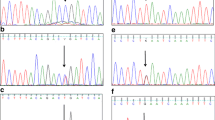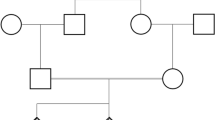Abstract
Leydig cell hypoplasia (LCH) due to inactivating mutations of luteinizing hormone receptor gene (LHCGR) is a relatively rare form of 46,XY disorder of sex development (DSD). LCH is inherited in an autosomal recessive manner, which leads to aberration of Leydig cell differentiation and ultimately subnormal androgen production both pre- and postnatally. In males, two distinct phenotypes have been described in the literature depending on the degree of remaining activity of LHCGR. Leydig cell hypoplasia type 1 (LCH type 1) represents more severe form with 46,XY DSD while Leydig cell hypoplasia type 2 (LCH type 2) is more diverse with micropenis to several degrees of undervirilization. We identified one kindred with 27-bp insertion in exon 1 causing 46,XY DSD.
Access this chapter
Tax calculation will be finalised at checkout
Purchases are for personal use only
Similar content being viewed by others
References
Richter-Unruh A, Martens JW et al (2002) Leydig cell hypoplasia: cases with new mutations, new polymorphisms and cases without mutations in the luteinizing hormone receptor gene. Clin Endocrinol (Oxf) 56:103–112.
McFarland KC, Sprengel R et al (1989) Lutropin-choriogonadotropin receptor: an unusual member of the G protein-coupled receptor family. Science 245:494–499.
Wu SM, Hallermeier KM et al (1998) Inactivation of the luteinizing hormone/chorionic gonadotropin receptor by an insertional mutation in Leydig cell hypoplasia. Mol Endocrinol 12:1651–1660.
Author information
Authors and Affiliations
Corresponding author
Editor information
Editors and Affiliations
Rights and permissions
Copyright information
© 2011 Springer Science+Business Media, LLC
About this paper
Cite this paper
Sinha, S.K., Bhangoo, A., Ten, S., Gromoll, J. (2011). Leydig Cell Hypoplasia due to Inactivating Luteinizing Hormone/Chorionic Gonadotropin Receptor Gene Mutation Presenting as a 46,XY DSD. In: New, M., Simpson, J. (eds) Hormonal and Genetic Basis of Sexual Differentiation Disorders and Hot Topics in Endocrinology: Proceedings of the 2nd World Conference. Advances in Experimental Medicine and Biology, vol 707. Springer, New York, NY. https://doi.org/10.1007/978-1-4419-8002-1_32
Download citation
DOI: https://doi.org/10.1007/978-1-4419-8002-1_32
Published:
Publisher Name: Springer, New York, NY
Print ISBN: 978-1-4419-8001-4
Online ISBN: 978-1-4419-8002-1
eBook Packages: Biomedical and Life SciencesBiomedical and Life Sciences (R0)




